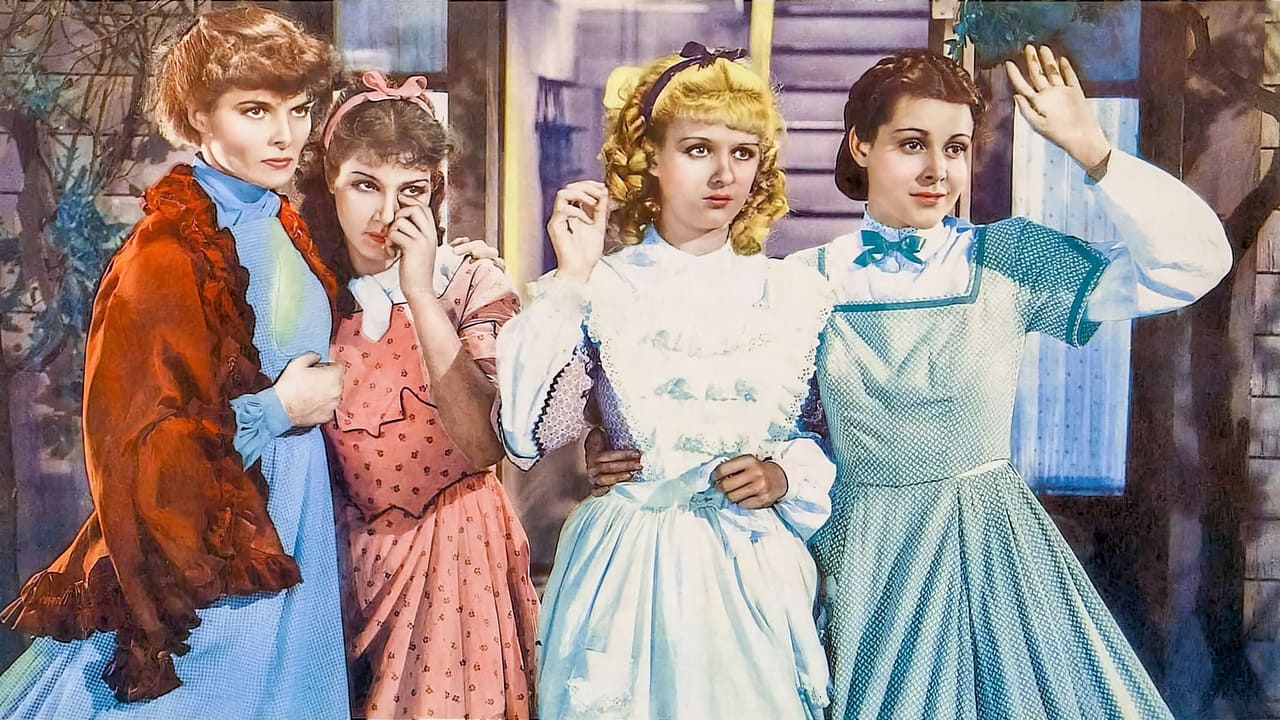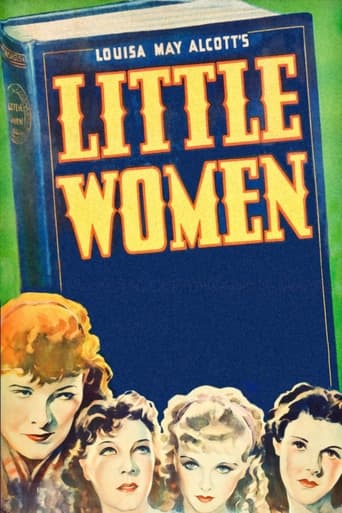

Clever and entertaining enough to recommend even to members of the 1%
... View MoreIt is interesting even when nothing much happens, which is for most of its 3-hour running time. Read full review
... View MoreOne of the best movies of the year! Incredible from the beginning to the end.
... View MoreThe movie really just wants to entertain people.
... View MoreGood if dated version of the Alcott perennial. The story is faithful to the book but some of the acting and filming techniques show signs of the film's age. Still if you're a fan of the book there is much to like here. Hepburn of course is ideally cast as Jo, perhaps one of the classic examples of an actress and a part completely suited to each other. Frances Dee and Jean Parker acquit themselves well as Meg and Beth respectively but those two sisters, even with Beth's tragedy, are the two blandest characters in the book. Joan Bennett is sulky and kittenish as the selfish Amy filling the part but she really wasn't to come into her own as a presence that registered on the screen for about five more years when she switched from blonde ingénue to brunette woman of mystery and usually danger. The great Edna May Oliver scores as the salty Aunt March and Spring Byington is strong as Marmee although her role is somewhat diminished from the book. It's interesting still to see her here as a tower of strength and rectitude considering her long career as a chic but usually addle-pated society woman. The men however are a totally different matter. Douglass Montgomery as Laurie is simpering and bland. Also while it isn't his fault his makeup is so heavy that it is completely distracting whenever he is on screen. John Davis Lodge who plays Meg's husband Mr. Brooke suffers the same fate. Cukor as always directs well. He hated the term woman's director but he really was one of the absolute best at bringing out high quality performances from his actresses, not just the stars but the supporting players.
... View MoreFew would deny the powerful presence of Katherine Hepburn in any movie she ever made. In this first screen adaptation with sound of Louisa May Alcott's famous novel, Hepburn IS the movie. That is to say, her part, her lines, her camera time seem to surpass the combined times of all the rest of the cast. While that may be as one would expect for many stories – a star or hero being the focal point of a whole work, this film, based on this book, was supposed to be about several "little women." So, most of the rest of the characters in the film – save a neighbor male friend, really get short shrift. For that reason, and a few others I'll mention, I think this rendition falls short of the interesting story told in the book. I would like to have seen more development of the sisters than this film has. The later remake – 1949's MGM production, does flesh out all the characters more. The problem with the overly heavy emphasis on the one character in this first movie is that the audience doesn't get much of a sense of who are the rest of the members of the family. So we can't so readily experience the ups and downs, the emotions, the tragedy and love felt between the sisters and their mother. Hepburn does a very good Jo, but not great. I think her efforts to be the tomboy were overdone in a few instances, which only drew my attention to this aspect of her role. She didn't seem to come by it naturally. One example was when she spoke a couple of times, acting and deliberately mimicking a deep-throated guttural voice for a man. At other times, she seemed to push it a bit and overact in flamboyance of tom-boyish behavior. There were no other notable performances by other cast members. Paul Lukas as Professor Bhaer and Douglas Montgomery as Laurie were good. Most of the rest were just OK or non-descript. One member was just not right for the role of Marmee. Spring Byington brought no depth or real feel to the role that the viewer could sense. But, then, the film just seemed to glide over the lesser roles. "Little Women" is a good story in the American library, and this film is enjoyable to watch. But, for a much more involving and endearing film, be sure to see the 1949 rendition by MGM.
... View MoreThe oft-filmed Alcott novel received its first lavish production in this 1933 version and it's quite good-looking. Hepburn is fine if sometimes overly expressive as the headstrong Jo March and Lukas makes a good impression as Professor Bhaer, but much of the acting is rather stagy and melodramatic. Montgomery makes a very effeminate and wimpy Laurie. Cukor made some fine films through his long career but his early efforts, including "Dinner at Eight," also from 1933, leave much to be desired. He also has a tendency to make things schmaltzy, not helped by the sappy performance of Byington as the mother. The film also goes on perhaps a bit too long.
... View MoreLITTLE WOMEN (RKO Radio, 1933), directed by George Cukor, from the novel by Louisa May Alcott, ranks one of the very best screen adaptations taken from classic literature. Produced by David O. Selznick, who later brought forth such literary works as David COPPERFIELD and A TALE OF TWO CITIES (MGM, 1935) to the screen, LITTLE WOMEN demonstrates to the highest degree on how carefully constructed these movies were made and the way its leading players have brought these storybook characters to life.Set during the Civil War years, the story revolves around the March family of Concord, Massachusetts. The plot development starts with the introduction of its individual members: Marmee (Spring Byington), a loving wife and mother who does all she can to keep her family together while her husband (Samuel S. Hinds) is off to war; Josephine, better known as Jo (Katharine Hepburn), a long haired, outspoken tomboy with a catch phrase, "Christopher Columbus!," whose ambition is to become famous novelist; Amy (Joan Bennett), a student in a school for girls, is cute, selfish, and a sketching artist; Margaret, or "Meg" (Frances Dee), a refined but envious girl working as a nursery governess; Beth (Jean Parker), the youngest of the sisters, is sweet, shy and a musically inclined piano player of classical pieces; and Aunt March (Edna May Oliver), an rich old spinster who's just as headstrong as her niece, Jo. The March family live next door to Mr. Laurence (Henry Stephenson), a gruff but kindly old gentleman, whose grandson, Laurie (Douglass Montgomery), becomes Jo's first love. Over the years the girls mature, finding new interests and beaus. Laurie returns home from college finding Jo's feelings towards him have changed; Meg finds love and marries John Brooke (John Lodge), a sophisticated gentleman; Amy matures and falls in love with Laurie; while Beth becomes the center of a crisis when falling ill with scarlet fever. As for Jo, she moves to a boarding house in New York City where she encounters Fritz Bhaer (Paul Lukas), a kindly professor who encourages her writing ability.While it's impossible to recapture every page of "Little Women" to the screen, screenwriters Sarah Y. Mason and Victor Heerman successfully abridged many of the key elements taken from various chapters, with a few alterations, into playable length of 116 minutes. Previously filmed during the silent era (1918) and remade several times thereafter (1949 for MGM; 1978 television movie; and 1994 Columbia theatrical adaptation), this 1933 carnation remains one of the perennial favorites of all time, and it's easy to see why. Full of nostalgic touches, from its opening credits with a silent movie feel, authentic costumes and hair styles that capture the era, George Cukor's masterful direction with taste and skill brings forth winning performances by entire cast, especially Katharine Hepburn, in a role she was born to play. Although Hepburn's Jo is tough as well as confident, her biggest fear is letting go of her childhood, wanting things to remain as they are, continuing to have those carefree happy times with her sisters. She realizes how impossible it is after Meg, the eldest, marries to have a family of her own. ("We can't be children forever.") Joan Bennett also does a commendable job transforming from child-like schoolgirl to mature young lady; and Spring Byington, best known for her lovable comedic characters in latter years, in her movie debut and one of her few opportunities on screen as a serious actress. Last but not least is the memorable Max Steiner underscore.When presented to commercial television during the Christmas season from the 1960s to 70s, all copies in circulation were shorter 107 minute prints. Aside from the Selznick International trademark in place of the original RKO Radio logo, the opening ten minute segment was missing, starting the story with Beth greeting her three sisters at the front door as they come in from the cold. This missing sequence was later restored in the 1980s when distributed to video cassette. The introductory RKO Radio logo was finally restored and presented for the first time in decades on Turner Classic Movies in 2006.Little known facts: LITTLE WOMEN brought forth a sequel, LITTLE MEN (Mascot, 1935) with Erin O'Brien Moore as Jo. In TCM's December 2006 presentation of LITTLE WOMEN on "The Essentials," in an after film discussion, movie critic Molly Haskell talks with host Bob Osborne making an interesting point about Jo's character from the book marrying and giving up her writing career as compared to Hepburn's more liberated Jo on screen.While LITTLE WOMEN is categorized a Christmas movie, for which it opens and ends years later during that joyful holiday season, it's one of those heartfelt family films that can be seen and appreciated at any given time of the year. (****)
... View More